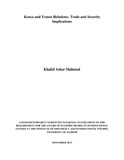| dc.description.abstract | Kenya and Yemen relations date back when the Yemeni Arabs arrived in Kenya. The two
countries benefit from each other’s warm and friendly relations. To illustrate this there are a
large number of Kenyans who are working and living in Yemen. However there have been some
challenges to these where Kenyans entering Yemen are given visas at the point of entry thus
making it difficult for the Yemen Embassy in Nairobi to have an exact figure of Kenyan
nationals living and working there. The primary aim of this study is on Kenya and Yemen
relations. Kenya has conducted its relations with Yemen by exporting coffee, tea among other
commodities. Yemen on the other hand has also done the same and recently resumed its flights
from Nairobi to Nairobi. However these relations have been faced with a number of challenges
such as Al-Qaeda, issues to do with refugees, insecurity, terrorism, inter-tribal conflict, early
child marriages among others. These challenges are what will make up the statement of the
problem of this paper. The objectives of this research study will comprise of examining the
security benefits that can accrue to Kenya as a result of forging stronger diplomatic ties with
Yemen, to investigate how stronger Kenya-Yemen relations can help Kenya in accessing the
Middle East market and lastly to examine the challenges facing the relations between Kenya and
Yemen. This research is guided by the liberalism theory as articulated by Immanuel Kant, John
Locke, Johann Gottlieb Fichte, G. W. F. Hegel and many others. Their main argument is that
man is not bad, but it is the institutions that make man to be bad. The study will use both
qualitative and quantitative methods of collecting data. This study will use explanatory or
descriptive research which will identify six study units namely-: NGO/civil society, government
officials, security/military agencies, business community, diplomats and professionals. These
groups of people will provide 30 respondents. Data was analyzed using the Statistical Package
for Social Sciences (SPSS). The study concluded that stronger Kenya and Yemen relations can
be enhanced through the easy access of Kenyan visa by Yemeni’s and the signing of agreements
on terrorism and other threats that affect the two countries. Further, the study also concluded that
the historical/cultural/economic relations existing between the two countries can help Kenya in
accessing Middle East market. On matters touching on security the study concluded that that
security benefits that can accrue to Kenya as a result of forging stronger diplomatic ties with
Yemen would be reduced threats of terrorism as a result of factors such as signing of bilateral
agreements and establishing border surveillance controls, exchange of security intelligence and
implementation of signed security agreements. On challenges facing the relations between Kenya
and Yemen most respondents stated high tariffs on goods and restriction of movement of people
and goods as a result of lack of a trading bloc was a challenge facing the relations between
Kenya and Yemen. The study recommends establishment of a Kenya diplomatic mission in
Yemen in order to positively influence trade and security relations between the two countries. It
further recommends the signing of bilateral agreements and establishing border surveillance
controls, exchange of security intelligence and implementation of signed security agreements and
promoting peace negotiations and diplomacy in order to combat security issues overlapping the
borders of the two countries. On the issue of high tariffs the study recommends the establishment
of a trading bloc to curb high tariffs on goods and restriction of movement of people and goods | en |

